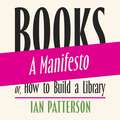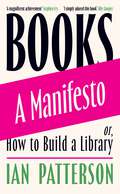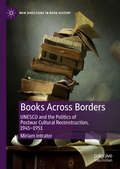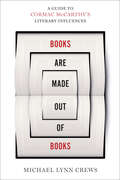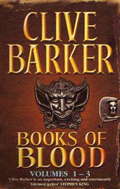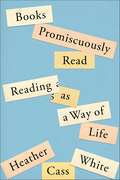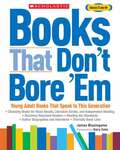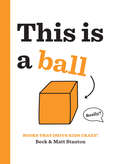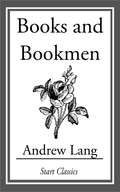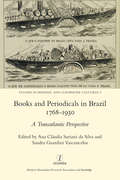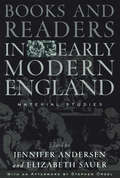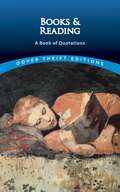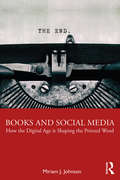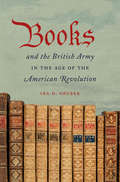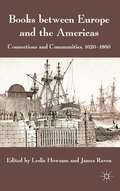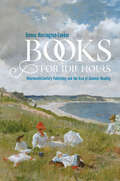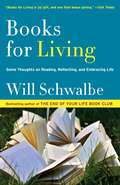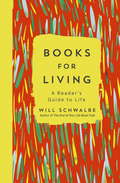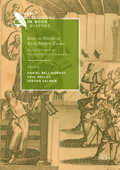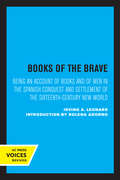- Table View
- List View
Books - A Manifesto: Or, How to Build a Library
by Ian PattersonThis is a book about books, about the subversive power of reading and the strange, enduring magic of books as objects. Ever since childhood, books have been at the centre of Ian Patterson's life, as a poet, teacher, translator, bookseller and collector. As he constructs the last of many libraries, he makes an impassioned case for the radical importance of reading in our lives - from Proust to Jilly Cooper, from golden-age detective novels to avant-garde poetry. Wise, irreverent and exhilaratingly wide-ranging, Books: A Manifesto reminds us that poems know things that we might not yet know ourselves, urges us to seek out the puzzles alive in the art of translation and celebrates the singular elasticity of the 'bookshop minute'. But even more than this, the book insists on reading not as a luxury but a necessary part of reality: we live within language, and when we think, it's with the tools that reading gives us. Our time of cultural and political crisis demands more than books - but without them, and without the breadth of knowledge, sense of history, awareness of alternatives and hope for the future they offer, things will not get better. At once a primer for enriching your own library and a manifesto for why that matters, this book is an invitation to a deeper, richer world of thought and feeling - and a reminder of just how much books matter.
Books - A Manifesto: Or, How to Build a Library
by Ian PattersonThis is a book about books, about the subversive power of reading and the strange, enduring magic of books as objects. Ever since childhood, books have been at the centre of Ian Patterson's life, as a poet, teacher, translator, bookseller and collector. As he constructs the last of many libraries, he makes an impassioned case for the radical importance of reading in our lives - from Proust to Jilly Cooper, from golden-age detective novels to avant-garde poetry. Wise, irreverent and exhilaratingly wide-ranging, Books: A Manifesto reminds us that poems know things that we might not yet know ourselves, urges us to seek out the puzzles alive in the art of translation and celebrates the singular elasticity of the 'bookshop minute'. But even more than this, the book insists on reading not as a luxury but a necessary part of reality: we live within language, and when we think, it's with the tools that reading gives us. Our time of cultural and political crisis demands more than books - but without them, and without the breadth of knowledge, sense of history, awareness of alternatives and hope for the future they offer, things will not get better. At once a primer for enriching your own library and a manifesto for why that matters, this book is an invitation to a deeper, richer world of thought and feeling - and a reminder of just how much books matter.
Books Across Borders: UNESCO and the Politics of Postwar Cultural Reconstruction, 1945–1951 (New Directions in Book History)
by Miriam IntratorBooks Across Borders: UNESCO and the Politics of Postwar Cultural Reconstruction, 1945-1951 is a history of the emotional, ideological, informational, and technical power and meaning of books and libraries in the aftermath of World War II, examined through the cultural reconstruction activities undertaken by the Libraries Section of the United Nations Educational, Scientific and Cultural Organization (UNESCO). The book focuses on the key actors and on-the-ground work of the Libraries Section in four central areas: empowering libraries around the world to acquire the books they wanted and needed; facilitating expanded global production of quality translations and affordable books; participating in debates over the contested fate of confiscated books and displaced libraries; and formulating notions of cultural rights as human rights. Through examples from France, Poland, and surviving Jewish Europe, this book provides new insight into the complexities and specificities of UNESCO’s role in the realm of books, libraries, and networks of information exchange during the early postwar, post-Holocaust, Cold War years.
Books Are Made Out of Books: A Guide to Cormac McCarthy's Literary Influences
by Michael Lynn CrewsA “comprehensive and enlightening” study of Cormac McCarthy’s literary influences, based on newly acquired archival materials (Times Literary Supplement).Though Cormac McCarthy once told an interviewer for the New York Times Magazine that “books are made out of books,” he has been famously unwilling to discuss how his own writing draws on the works of other writers. Yet his novels and plays masterfully appropriate and allude to an extensive range of literary works, demonstrating that McCarthy is well aware of literary tradition, respectful of the canon, and deliberately situating himself in a knowing relationship to precursors.The Wittliff Collection at Texas State University acquired McCarthy’s literary archive in 2007. In Books Are Made Out of Books, Michael Lynn Crews thoroughly mines the archive to identify nearly 150 writers and thinkers that McCarthy himself references in early drafts, marginalia, notes, and correspondence. Crews organizes the references into chapters devoted to McCarthy’s published works, the unpublished screenplay Whales and Men, and McCarthy’s correspondence. For each work, Crews identifies the authors, artists, or other cultural figures that McCarthy references; gives the source of the reference in McCarthy’s papers; provides context for the reference as it appears in the archives; and explains the significance of the reference to the novel or play that McCarthy was working on. This groundbreaking exploration of McCarthy’s literary influences—impossible to undertake before the opening of the archive—vastly expands our understanding of how one of America’s foremost authors has engaged with the ideas, images, metaphors, and language of other thinkers and made them his own.
Books Are Made Out of Books: A Guide to Cormac McCarthy's Literary Influences
by Michael Lynn CrewsA “comprehensive and enlightening” study of Cormac McCarthy’s literary influences, based on newly acquired archival materials (Times Literary Supplement).Though Cormac McCarthy once told an interviewer for the New York Times Magazine that “books are made out of books,” he has been famously unwilling to discuss how his own writing draws on the works of other writers. Yet his novels and plays masterfully appropriate and allude to an extensive range of literary works, demonstrating that McCarthy is well aware of literary tradition, respectful of the canon, and deliberately situating himself in a knowing relationship to precursors.The Wittliff Collection at Texas State University acquired McCarthy’s literary archive in 2007. In Books Are Made Out of Books, Michael Lynn Crews thoroughly mines the archive to identify nearly 150 writers and thinkers that McCarthy himself references in early drafts, marginalia, notes, and correspondence. Crews organizes the references into chapters devoted to McCarthy’s published works, the unpublished screenplay Whales and Men, and McCarthy’s correspondence. For each work, Crews identifies the authors, artists, or other cultural figures that McCarthy references; gives the source of the reference in McCarthy’s papers; provides context for the reference as it appears in the archives; and explains the significance of the reference to the novel or play that McCarthy was working on. This groundbreaking exploration of McCarthy’s literary influences—impossible to undertake before the opening of the archive—vastly expands our understanding of how one of America’s foremost authors has engaged with the ideas, images, metaphors, and language of other thinkers and made them his own.
Books Of Blood Omnibus 1: Volumes 1-3
by Clive BarkerHere are the stories written on the Book of Blood. They are a map of that dark highway that leads out of life towards unknown destinations. Few will have to take it. Most will go peacefully along lamplit streets, ushered out of living with prayers and caresses. But for a few, the horrors will come, skipping, to fetch them off to the highway of the damned ...Gathered together for the first time in one volume, here are fifteen mind-shattering stories from the awesome imagination of World Fantasy Award winning author Clive Barker. They will take you to the brink - and beyond ...
Books Of Blood Omnibus 1: Volumes 1-3
by Clive BarkerHere are the stories written on the Book of Blood. They are a map of that dark highway that leads out of life towards unknown destinations. Few will have to take it. Most will go peacefully along lamplit streets, ushered out of living with prayers and caresses. But for a few, the horrors will come, skipping, to fetch them off to the highway of the damned ...Gathered together for the first time in one volume, here are fifteen mind-shattering stories from the awesome imagination of World Fantasy Award winning author Clive Barker. They will take you to the brink - and beyond ...
Books Promiscuously Read: Reading as a Way of Life
by Heather Cass WhiteThe critic and scholar Heather Cass White offers an exploration of the nature of readingHeather Cass White’s BooksPromiscuously Read is about the pleasures of reading and its power in shaping our internal lives. It advocates for a life of constant, disorderly, time-consuming reading, and encourages readers to trust in the value of the exhilaration and fascination such reading entails. Rather than arguing for the moral value of reading or the preeminence of literature as an aesthetic form, BooksPromiscuously Read illustrates the irreplaceable experience of the self that reading provides for those inclined to do it.Through three sections—Play, Transgression, and Insight—which focus on three ways of thinking about reading, BooksPromiscuously Read moves among and considers many poems, novels, stories, and works of nonfiction. The prose is shot through with quotations reflecting the way readers think through the words of others.BooksPromiscuously Read is a tribute to the whole lives readers live in their books, and aims to recommit people to those lives. As White writes, “What matters is staying attuned to an ordinary, unflashy, mutely persistent miracle; that all the books to be read, and all the selves to be because we have read them, are still there, still waiting, still undiminished in their power. It is an astonishing joy.”
Books That Don't Bore 'Em: Young Adult Books That Speak to This Generation
by James BlasingameYoung adult literature can have a powerful impact on students' reading and intellectual development. In this book, young adult literature expert Jim Blasingame helps teachers understand the power and purpose of young adult literature. He also presents instructional strategies proven to facilitate students' interactions with texts and promote higher order thinking skills. He includes many annotated lists organized by theme, topic, genre, reading level, and more of the best young adult books as well as fascinating interviews with 30 of today's most popular YA authors. For use with Grades 5 and up.
Books That Drive Kids CRAZY!: This Is a Ball (Books That Drive Kids CRAZY! #2)
by Beck Stanton Matt StantonFor the giggling masses who love Hervé Tullet's Press Here, BJ Novak's The Book With No Pictures, and Bill Cotter's Don't Push the Button comes an interactive new series! The Books That Drive Kids CRAZY! series offers parents, teachers, and storytellers a hilarious script for fun reading time together. Book 2, This Is a Ball, is a boldly absurd spin-off of concept books, and an audaciously contrarian invitation for readers to practice deadpan delivery: after all, the picture on the cover clearly shows a cube, not a ball. The page that declares a princess is flying a kite at the beach shows an alien holding a balloon in a city...and on and on. What is WRONG with this silly book? Kids will demand to know--and all readers will be howling with laughter all along the way. With strikingly simple text and art, Books That Drive Kids CRAZY! are ideal picks for emergent readers.
Books and Bookmen
by Andrew LangAndrew Lang (1844-1912) was a prolific Scots man of letters, a poet, novelist, literary critic and contributor to anthropology. He now is best known as the collector of folk and fairy tales. As a journalist, poet, critic and historian, he soon made a reputation as one of the ablest and most versatile writers of the day. Lang was one of the founders of the study of "Psychical Research," and his other writings on anthropology include The Book of Dreams and Ghosts (1897), Magic and Religion (1901) and The Secret of the Totem (1905). He was a Homeric scholar of conservative views. Other works include Homer and the Epic (1893); a prose translation of The Homeric Hymns (1899), with literary and mythological essays in which he draws parallels between Greek myths and other mythologies; and Homer and his Age (1906). He also wrote Ballades in Blue China (1880) and Rhymes à la Mode (1884).
Books and Periodicals in Brazil 1768-1930
by AnaClaudiaSurianiDa SilvaBefore the Portuguese Royal Court moved to its South-American colony in 1808, books and periodicals had a very limited circulation there. It was only when Brazilian ports were opened to foreign trade that the book trade began to flourish, and printed matter became more easily available to readers, whether for pleasure, for instruction or for political reasons. This book brings together a collection of original articles on the transnational relations between Brazil and Europe, especially England and France, in the domain of literature and print culture from its early stages to the end of the 1920s. It covers the time when it was forbidden to print in Brazil, and Portugal strictly controlled which books were sent to the colony, through the quick flourishing of a transnational printing industry and book market after 1822, to the shift of hegemony in the printing business from foreign to Brazilian hands at the beginning of the twentieth century. Sandra Guardini Vasconcelos is Professor of English and Comparative Literature at the University of Sao Paulo.
Books and Readers in Early Modern England
by Stephen Orgel Elizabeth Sauer Jennifer AndersenBooks and Readers in Early Modern England examines readers, reading, and publication practices from the Renaissance to the Restoration. The essays draw on an array of documentary evidence--from library catalogs, prefaces, title pages and dedications, marginalia, commonplace books, and letters to ink, paper, and bindings--to explore individual reading habits and experiences in a period of religious dissent, political instability, and cultural transformation. Chapters in the volume cover oral, scribal, and print cultures, examining the emergence of the "public spheres" of reading practices. Contributors, who include Christopher Grose, Ann Hughes, David Scott Kastan, Kathleen Lynch, William Sherman, and Peter Stallybrass, investigate interactions among publishers, texts, authors, and audience. They discuss the continuity of the written word and habits of mind in the world of print, the formation and differentiation of readerships, and the increasing influence of public opinion. The work demonstrates that early modern publications appeared in a wide variety of forms--from periodical literature to polemical pamphlets--and reflected the radical transformations occurring at the time in the dissemination of knowledge through the written word. These forms were far more ephemeral, and far more widely available, than modern stereotypes of writing from this period suggest.
Books and Reading: A Book of Quotations (Dover Thrift Editions)
by Bill Bradfield"Let blockheads read what blockheads write," suggested Lord Chesterfield. W. H. Auden once said, "Some books are undeservedly forgotten; none are undeservedly remembered." And TV celebrity Jerry Seinfeld noted: "The big advantage of a book is that it's very easy to rewind. Close it and you're right back at the beginning." Over 450 memorable quotes about books and reading fill these pages -- with provocative declarations from Mark Twain, Virginia Woolf, Andrew Carnegie, Theodore Roosevelt, James Thurber, Anna Quindlen, and Oprah Winfrey, among others. A handy aid for speech writers and public speakers, this entertaining collection will also delight general readers.
Books and Social Media: How the Digital Age is Shaping the Printed Word
by Miriam J. JohnsonSocial media and digital technologies are transforming what and how we read. Books and Social Media considers the way in which readers and writers come together in digital communities to discover and create new works of fiction. This new way of engaging with fiction stretches the boundaries of what has been considered a book in the past by moving beyond the physical or even digitally bound object to the consideration of content, containers, and the ability to share. Using empirical data and up-to-date research methods, Miriam Johnson introduces the ways in which digitally social platforms give rise to a new type of citizen author who chooses to sidestep the industry’s gatekeepers and share their works directly with interested readers on social platforms. Gender and genre, especially, play a key role in developing the communities in which these authors write. The use of surveys, interviews, and data mining brings to the fore issues of gender, genre, community, and power, which highlight the push and pull between these writers and the industry. Questioning what we always thought we knew about what makes a book and traditional publishing channels, this book will be of interest to anyone studying or researching publishing, book history, print cultures, and digital and contemporary literatures.
Books and the British Army in the Age of the American Revolution
by Ira D. GruberHistorians have long understood that books were important to the British army in defining the duties of its officers, regulating tactics, developing the art of war, and recording the history of campaigns and commanders. Now, in this groundbreaking analysis, Ira D. Gruber identifies which among over nine hundred books on war were considered most important by British officers and how those books might have affected the army from one era to another. By examining the preferences of some forty-two officers who served between the War of the Spanish Succession and the French Revolution, Gruber shows that by the middle of the eighteenth century British officers were discriminating in their choices of books on war and, further, that their emerging preference for Continental books affected their understanding of warfare and their conduct of operations in the American Revolution. In their increasing enthusiasm for books on war, Gruber concludes, British officers were laying the foundation for the nineteenth-century professionalization of their nation's officer corps. Gruber's analysis is enhanced with detailed and comprehensive bibliographies and tables. Historians have long understood that books were important to the British army in defining the duties of its officers, regulating tactics, developing the art of war, and recording the history of campaigns and commanders. Now, in this groundbreaking analysis, Ira D. Gruber identifies which among over nine hundred books on war were considered most important by British officers and how those books might have affected the army from one era to another. By examining the preferences of some forty-two officers who served between the War of the Spanish Succession and the French Revolution, Gruber shows that by the middle of the eighteenth century British officers were discriminating in their choices of books on war and, further, that their emerging preference for Continental books affected their understanding of warfare and their conduct of operations in the American Revolution. In their increasing enthusiasm for books on war, Gruber concludes, British officers were laying the foundation for the nineteenth-century professionalization of their nation's officer corps. Gruber's analysis is enhanced with detailed and comprehensive bibliographies and tables.
Books between Europe and the Americas: Connections and Communities, 1620�1860
by Leslie Howsam James RavenBooks between Europe and the Americas is a ground-breaking collection of essays by thirteen distinguished international scholars. It opens with a survey of current research, presenting fresh historical perspectives on the exchange of culture and ideas across the Atlantic. Contributions reveal how distances were bridged and isolated communities supported and strengthened by the transmission of books, print and correspondence. In particular, the collection offers pioneering comparisons between the northern Atlantic and that of Spanish and Portuguese territories further south. The volume opens with a survey of current research in transatlantic book history and explorations of overseas news in the 1620s, the American reception of Faustus and later accounts of scandal and heroism, and print and manuscript transmission in early Canada. Other essays consider British Atlantic naturalists, the Dutch New York book trade, the circulation of Latin and Greek texts in North and Central America, the Belfast-Philadelphia book trade, the transatlantic Brazilian novel, the arrival of the monitorial system in Spanish America, and US book imports and transatlantic crusades against slavery in the mid nineteenth century.
Books for Children, Books for Adults
by Teresa MichalsIn this groundbreaking and wide-ranging study, Teresa Michals explores why some books originally written for a mixed-age audience, such as Daniel Defoe's Robinson Crusoe, eventually became children's literature, while others, such as Samuel Richardson's Pamela, became adult novels. Michals considers how historically specific ideas about age shaped not only the readership of novels, but also the ways that characters are represented within them. Arguing that age is first understood through social status, and later through the ideal of psychological development, the book examines the new determination of authors at the end of the nineteenth century, such as Henry James, to write for an audience of adults only. In these novels and in their reception, a world of masters and servants became a world of adults and children.
Books for Idle Hours: Nineteenth-Century Publishing and the Rise of Summer Reading (Studies In Print Culture And The History Of The Book Ser.)
by Donna Harrington-Lueker“A fascinating study” of the nineteenth-century roots of beach books and summer reads—and the public disapproval that failed to stop the enjoyment of them (New England Quarterly).The publishing phenomenon of summer reading, often focused on novels set in vacation destinations, started in the nineteenth century, as both print culture and tourist culture expanded in the United States. As an emerging middle class increasingly embraced summer leisure as a marker of social status, book publishers sought new market opportunities, authors discovered a growing readership, and more readers indulged in lighter fare.Drawing on publishing records, book reviews, readers’ diaries, and popular novels of the period, Donna Harrington-Lueker explores the beginning of summer reading and the backlash against it. Countering fears about the dangers of leisurely reading—especially for young women—publishers framed summer reading not as a disreputable habit but a respectable pastime and welcome respite. Books for Idle Hours sheds new sunlight on an ongoing seasonal tradition.“Books for Idle Hours is especially interesting on the emergence of a new type of textual diversion: the American summer novel . . . it takes these books—and the culture that shaped them, and the culture they shaped—seriously, even while acknowledging how transitory they were.” —The New Yorker“A fascinating study of a distinct but largely overlooked body of nineteenth-century American fiction and the authors, readers, publishers, and economic and social conditions that gave rise to it.” —New England Quarterly“Incisive commentary on the relationship between market forces and readers’ tastes . . . As enjoyable as it is informative.” —Reception
Books for Living
by Will SchwalbeFrom the author of the beloved New York Times best-selling The End of Your Life Book Club, an inspiring and magical exploration of the power of books to shape our lives in an era of constant connectivity. Why is it that we read? Is it to pass time? To learn something new? To escape from reality? For Will Schwalbe, reading is a way to entertain himself but also to make sense of the world, to become a better person, and to find the answers to the big (and small) questions about how to live his life. In this delightful celebration of reading, Schwalbe invites us along on his quest for books that speak to the specific challenges of living in our modern world, with all its noise and distractions. In each chapter, he discusses a particular book—what brought him to it (or vice versa), the people in his life he associates with it, and how it became a part of his understanding of himself in the world. These books span centuries and genres (from classic works of adult and children’s literature to contemporary thrillers and even cookbooks), and each one relates to the questions and concerns we all share. Throughout, Schwalbe focuses on the way certain books can help us honor those we’ve loved and lost, and also figure out how to live each day more fully. Rich with stories and recommendations, Books for Living is a treasure for everyone who loves books and loves to hear the answer to the question: “What are you reading?”From the Hardcover edition.
Books for Living: a reader's guide to life
by Will SchwalbeFrom the author of the international bestseller The End of Your Life Book Club, an inspiring and magical exploration of the enduring power of books - a must for all passionate book lovers, exploring books as diverse as The Girl on the Train, The Little Prince and David Copperfield.'I've always believed that everything you need to know can be found in a book.' Will SchwalbeWhy is it that we read? Is it to pass time? To learn something new? To escape into another reality? For Will Schwalbe, reading is a way to entertain himself but also to make sense of the world, to become a better person, and to find the answers to the big (and small) questions about how to live his life. In this delightful celebration of reading, Schwalbe invites us along on his quest for books that speak to the specific challenges of living in our modern world, with all its noise and distractions. Rich with stories and recommendations, Books for Living is a treasure for everyone who loves books and loves to hear the answer to the question: "What are you reading?"
Books in Motion in Early Modern Europe: Beyond Production, Circulation and Consumption (New Directions in Book History)
by Daniel Bellingradt Paul Nelles Jeroen SalmanThis book presents and explores a challenging new approach in book history. It offers a coherent volume of thirteen chapters in the field of early modern book history covering a wide range of topics and it is written by renowned scholars in the field. The rationale and content of this volume will revitalize the theoretical and methodological debate in book history. The book will be of interest to scholars and students in the field of early modern book history as well as in a range of other disciplines. It offers book historians an innovative methodological approach on the life cycle of books in and outside Europe. It is also highly relevant for social-economic and cultural historians because of the focus on the commercial, legal, spatial, material and social aspects of book culture. Scholars that are interested in the history of science, ideas and news will find several chapters dedicated to the production, circulation and consumption of knowledge and news media.
Books of the Brave: Being an Account of Books and of Men in the Spanish Conquest and Settlement of the Sixteenth-Century New World
by Irving A. LeonardSince its original appearance in 1949, Irving A. Leonard's pioneering Books of the Brave has endured as the classic account of the introduction of literary culture to the Spanish New World. Leonard's study documents the works of fiction that accompanied and followed the conquistadores to the Americas and argues that popular texts influenced these men and shaped the way they thought and wrote about their experiences. UC Press's 1992 edition combines Leonard's text with a selection of the documents that were his most valuable sources—nine lists of books destined for the Indies. Containing a wealth of information, these lists provide the documentary evidence for what is perhaps Leonard's greatest contribution: his demonstration that royal and inquisitorial prohibitions failed to control the circulation of books and ideas in colonial Spanish America. Rolena Adorno's introduction reaffirms the lasting value of Books of the Brave and chronicles developments in cultural-historical studies that have shed light on the role of books in Spanish American colonial culture. Adorno situates Leonard's work at the threshold between older, triumphalist views of Spanish conquest history and more recent perspectives engendered by studies of native American peoples. With its rich descriptions of the book trade in both Spain and America, Books of the Brave has much to offer historians as well as literary critics. Indeed, it is a highly readable and engaging book for anyone interested in the cultural life of the New World. This title is part of UC Press's Voices Revived program, which commemorates University of California Press’s mission to seek out and cultivate the brightest minds and give them voice, reach, and impact. Drawing on a backlist dating to 1893, Voices Revived makes high-quality, peer-reviewed scholarship accessible once again using print-on-demand technology. This title was originally published in 1992.
